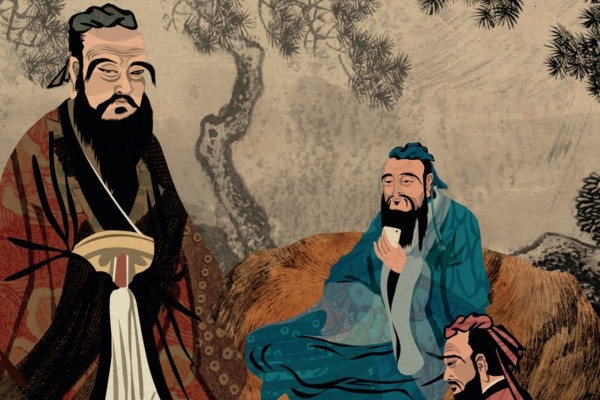Once, when Zhong Ni was unoccupied, and his disciple Zeng was sitting by in attendance on him, the Master said, “The ancient kings had a perfect virtue and all-embracing rule of conduct, through which they were in accord with all under heaven. By the practice of it the people were brought to live in peace and harmony, and there was no ill-will between superiors and inferiors. Do you know what it was?”
Zeng rose from his mat and said, “How should I, Shen, who am so devoid of intelligence, be able to know this?”
The Master said, “It was filial piety. Now filial piety is the root of all virtue, and the stem out of which grows all moral teaching. Sit down again, and I will explain the subject to you. Our bodies – to every hair and bit of skin – are received by us from our parents, and we must not presume to injure or wound them. This is the beginning of filial piety. When we have established our character by the practice of the filial course, so as to make our name famous in future ages and thereby glorify our parents, this is the end of filial piety. It commences with the service of parents; it proceeds to the service of the ruler; it is completed by the establishment of character.
“It is said in the Major Odes of the Kingdom:
Ever think of your ancestor,
Cultivating your virtue.”
…
Filial Piety in the Princes of States
“Above others, and yet free from pride, they dwell on high, without peril. Adhering to economy and carefully observant of the rules and laws, they are full, without overflowing. To dwell on high without peril is the way long to preserve nobility; to be full without overflowing is the way long to preserve riches. When their riches and nobility do not leave their persons, then they are able to preserve the altars of their land and grain, and to secure the harmony of their people and men in office. This is the filial piety of the princes of states.
“It is said in the Book of Poetry:
Be apprehensive, be cautious,
As if on the brink of a deep abyss,
As if treading on thin ice.”
Filial Piety in High Ministers and Great Officers
“They do not presume to wear robes other than those appointed by the laws of the ancient kings, nor to speak words other than those sanctioned by their speech, nor to exhibit conduct other than that exemplified by their virtuous ways. Thus none of their words being contrary to those sanctions, and none of their actions contrary to the right way, from their mouths there comes no exceptionable speech, and in their conduct there are found no exceptionable actions. Their words may fill all under heaven, and no error of speech will be found in them. Their actions may fill all under heaven, and no dissatisfaction or dislike will be awakened by them. When these three things – their robes, their words, and their conduct – are all complete as they should be, they can then preserve their ancestral temples. This is the filial piety of high ministers and great officers.
“It is said in the Book of Poetry:
He is never idle, day or night,
In the service of the One man.”
Filial Piety in Inferior Officers
“As they serve their fathers, so they serve their mothers, and they love them equally. As they serve their fathers, so they serve their rulers, and they reverence them equally. Hence love is what is chiefly rendered to the mother, and reverence is what is chiefly rendered to the ruler, while both of these things are given to the father. Therefore when they serve their ruler with filial piety, they are loyal; when they serve their superiors with reverence, they are obedient. Not failing in this loyalty and obedience in serving those above them, they are then able to preserve their emoluments and positions, and to maintain their sacrifices. This is the filial piety of inferior officers.
“It is said in the Book of Poetry:
Rising early and going to sleep late,
Do not disgrace those who gave you birth.”
Filial Piety in Government
The Master said, “Anciently, when the intelligent kings by means of filial piety ruled all under heaven, they did not dare to receive with disrespect the ministers of small states. How much less would they do so to the dukes, marquises, counts, and barons! Thus it was that they got the princes of the myriad states with joyful hearts to assist them in the sacrificial services to their royal predecessors.
“The rulers of states did not dare to slight wifeless men and widows. How much less would they slight their officers and the people! Thus it was that they got all their people with joyful hearts to assist them in serving the rulers, their predecessors.
“The heads of clans did not dare to slight their servants and concubines. How much less would they slight their wives and sons! Thus it was that they got their men with joyful hearts to assist them in the service of their parents.
“In such a state of things, while alive, parents reposed in the glory of their sons, and, when sacrificed to, their disembodied spirits enjoyed their offerings. Therefore for all under heaven peace and harmony prevailed; disasters and calamities did not occur; misfortunes and rebellions did not arise.
“It is said in the Book of Poetry:
To an upright, virtuous conduct
All in the four quarters of the state render obedient homage.”
An Orderly Description of the Acts of Filial Piety
The Master said, “The service which a filial son does to his parents is as follows: In his general conduct to them, he manifests the utmost reverence. In his nourishing of them, his endeavour is to give them the utmost pleasure. When they are ill, he feels the greatest anxiety. In mourning for them dead, he exhibits every demonstration of grief. In sacrificing to them, he displays the utmost solemnity. When a son is complete in these five things, he may be pronounced able to serve his parents.
“He who thus serves his parents, in a high situation will be free from pride, in a low situation will be free from insubordination, and among his equals will not be quarrelsome. In a high situation pride leads to ruin; in a low situation insubordination leads to punishment; among equals quarrelsomeness leads to the wielding of weapons. If those three things be not put away, though a son every day contribute beef, mutton, and pork to nourish his parents, he is not filial.”
Filial Piety in Relation to the Five Punishments
The Master said, “There are three thousand offenses against which the five punishments are directed, and there is not one of them greater than being unfilial.
“When constraint is put upon a ruler, that is the disowning of his superiority. When the authority of the sages is disallowed, that is the disowning of all law. When filial piety is put aside, that is the disowning of the principle of affection. These three things pave the way to anarchy.”
The All-embracing Rule of Conduct
The Master said, “For teaching the people to be affectionate and loving, there is nothing better than filial piety. For teaching them the observance of propriety and submissiveness, there is nothing better than fraternal duty. For changing their manners and altering their customs, there is nothing better than music. For securing the repose of superiors and the good order of the people, there is nothing better than the rules of propriety.
“The rules of propriety are simply the development of the principle of reverence. Therefore the reverence paid to a father makes all sons pleased. The reverence paid to an elder brother makes all younger brothers pleased. The reverence paid to a ruler makes all subjects pleased. The reverence paid to the One man makes thousands and myriads of men pleased. The reverence is paid to a few, and the pleasure extends to many. This is what is meant by an ‘All-embracing Rule of Conduct.’”
The Perfect Virtue
The Master said, “The teaching of filial piety by the superior man does not require that he should go to family after family and daily see the members of each. His teaching of filial piety is a tribute of reverence to all the fathers under heaven. His teaching of fraternal submission is a tribute of reverence to all the elder brothers under heaven. His teaching of the duty of a subject is a tribute of reverence to all the rulers under heaven.
“It is said in the Book of Poetry:
The happy and courteous sovereign
Is the parent of the people.
“If it were not a perfect virtue, how could it be recognised as in accordance with their nature by the people so extensively as this?”
Making our Name Famous
The Master said, “The filial piety with which the superior man serves his parents may be transferred as loyalty to the ruler. The fraternal duty with which he serves his elder brother may be transferred as submissive deference to elders. His regulation of his family may be transferred as good government in any official position. Therefore, when his conduct is thus successful in his inner private circle, his name will be established and transmitted to future generations.”
Filial Piety in Relation to Reproof and Remonstrance
The disciple Zeng said, “I have heard your instructions on the affection of love, on respect and reverence, on giving repose to the minds of our parents, and on making our names famous. I would venture to ask if simple obedience to the orders of one’s father can be pronounced filial piety.”
The Master replied, “What words are these! What words are these! Anciently, if the Son of Heaven had seven ministers who would remonstrate with him, although he had not right methods of government, he would not lose his possession of the kingdom. If the prince of a state had five such ministers, though his measures might be equally wrong, he would not lose his state. If a great officer had three, he would not, in a similar case, lose the headship of his clan. If an inferior officer had a friend who would remonstrate with him, a good name would not cease to be connected with his character. And the father who had a son that would remonstrate with him would not sink into the gulf of unrighteous deeds. Therefore when a case of unrighteous conduct is concerned, a son must by no means keep from remonstrating with his father, nor a minister from remonstrating with his ruler. Hence, since remonstrance is required in the case of unrighteous conduct, how can simple obedience to the orders of a father be accounted filial piety?”
The Influence of Filial Piety and the Response to It
The Master said, “Anciently, the intelligent kings served their fathers with filial piety, and therefore they served Heaven with intelligence. They served their mothers with filial piety, and therefore they served Earth with discrimination. They pursued the right course with reference to their own seniors and juniors, and therefore they secured the regulation of the relations between superiors and inferiors throughout the kingdom. When Heaven and Earth were served with intelligence and discrimination, the spiritual intelligences displayed their retributive power.
“Therefore even the Son of Heaven must have some whom he honours; that is, he has his uncles of his surname. He must have some to whom he concedes the precedence; that is, he has his cousins, who bear the same surname and are older than himself. In the ancestral temple he manifests the utmost reverence, showing that he does not forget his parents. He cultivates his person and is careful of his conduct, fearing lest he should disgrace his predecessors. When in the ancestral temple he exhibits the utmost reverence, the spirits of the departed manifest themselves. Perfect filial piety and fraternal duty reach to and move the spiritual intelligences and diffuse their light on all within the four seas. They penetrate everywhere.
“It is said in the Book of Poetry:
From the west to the east,
From the south to the north,
There was not a thought but did him homage.”
Filial Piety in Mourning for Parents
The Master said, “When a filial son is mourning for a parent, he wails, but not with a prolonged sobbing. In the movements of ceremony he pays no attention to his appearance. His words are without elegance of phrase. He cannot bear to wear fine clothes. When he hears music, he feels no delight. When he eats a delicacy, he is not conscious of its flavour. Such is the nature of grief and sorrow.
“After three days he may partake of food, for thus the people are taught that the living should not be injured on account of the dead, and that emaciation must not be carried to the extinction of life. Such is the rule of the sages. The period of mourning does not go beyond three years, to show the people that it must have an end.
“An inner and outer coffin are made; the grave-clothes also are put on, and the shroud; and the body is lifted into the coffin. The sacrificial vessels, round and square, are regularly set forth, and the sight of them fills the mourners with fresh distress. The women beat their breasts, and the men stamp with their feet, wailing and weeping, while they sorrowfully escort the coffin to the grave. They consult the tortoise-shell to determine the grave and the ground about it, and there they lay the body in peace. They prepare the ancestral temple to receive the tablet of the departed, and there they present offerings to the disembodied spirit. In spring and autumn they offer sacrifices, thinking of the deceased as the seasons come round.
“The services of love and reverence to parents when alive, and those of grief and sorrow to them when dead: these completely discharge the fundamental duty of living men. The righteous claims of life and death are all satisfied, and the filial son’s service of his parents is completed.”
From the 'Family' edition, available from our online store.
From The Sacred Books of the East: The Texts of Confucianism, vol. III, part I: The Shu King, translated by James Legge.






